- Home
- Eric Meyer
Devil's Guard- The Complete Series Box Set
Devil's Guard- The Complete Series Box Set Read online
DEVIL’S GUARD
THE COMPLETE SERIES BOX SET
By Eric Meyer
Copyright 2017 by Eric Meyer
Published by Swordworks Books
All rights reserved. Without limiting the rights under copyright reserved above, no part of this publication may be reproduced, stored in or introduced into a retrieval system, or transmitted, in any form, or by any means (electronic, mechanical, photocopying, recording, or otherwise) without the prior written permission of both the copyright owner and the above publisher of this book.
This is a work of fiction. Names, characters, places, brands, media, and incidents are either the product of the author's imagination or are used fictitiously. The author acknowledges the trademarked status and trademark owners of various products referenced in this work of fiction, which have been used without permission. The publication/use of these trademarks is not authorized, associated with, or sponsored by the trademark owners.
Click on the link and tell me where to send the book!
CONTENTS
DEVIL'S GUARD BLOOD & SNOW
FOREWORD
INTRODUCTION
CHAPTER ONE
CHAPTER TWO
CHAPTER THREE
CHAPTER FOUR
CHAPTER FIVE
CHAPTER SIX
CHAPTER SEVEN
CHAPTER EIGHT
CHAPTER NINE
CHAPTER TEN
DEVIL'S GUARD BLOOD & IRON
FOREWORD
INTRODUCTION
Chapter One
Chapter Two
Chapter Three
Chapter Four
Chapter Five
Chapter Six
Chapter Seven
Chapter Eight
Chapter Nine
Chapter Ten
DEVIL'S GUARD: THE REAL STORY
FOREWORD
INTRODUCTION
CHAPTER ONE
CHAPTER TWO
CHAPTER THREE
CHAPTER FOUR
CHAPTER FIVE
CHAPTER SIX
CHAPTER SEVEN
CHAPTER EIGHT
CHAPTER NINE
CHAPTER TEN
DEVIL'S GUARD VIETNAM
Foreword
Introduction
Chapter One
Chapter Two
Chapter Three
Chapter Four
Chapter Five
Chapter Six
Chapter Seven
Chapter Eight
Chapter Nine
Chapter Ten
DEVIL'S GUARD COUNTERATTACK
FOREWORD
INTRODUCTION
CHAPTER 1
CHAPTER 2
CHAPTER 3
CHAPTER 4
CHAPTER 5
CHAPTER 6
CHAPTER 7
CHAPTER 8
CHAPTER 9
CHAPTER 10
DEVIL’S GUARD AFGHANISTAN
Chapter One
Chapter Two
Chapter Three
Chapter Four
Chapter Five
Chapter Six
Chapter Seven
Chapter Eight
Chapter Nine
Chapter Ten
Chapter Eleven
Chapter Twelve
Chapter Thirteen
Chapter Fourteen
Chapter Fifteen
DEVIL'S GUARD BLOOD & SNOW
by
Eric Meyer
PUBLISHED BY:
Swordworks Books
Devil's Guard Blood & Snow
Copyright © 2011 by Eric Meyer
FOREWORD
This is a story that for a number of reasons, was almost never told. The epic victory of the Soviet Armies at Stalingrad was an event as momentous to the Germans as it was to the Russians, though for different reasons. Five months later, the greatest tank battle in the history of armoured warfare took place at Kursk, resulting in the destruction of much of Germany’s irreplaceable armour. Yet in between these two great events there were many bloody battles, much of them taking place in and around Kharkov where constant attack and counterattack took its toll of the warring armies. It was into this maelstrom that Jurgen Hoffman began his military career and this story has been compiled from notes taken during that time. Incomplete notes, to be sure, and much of the surrounding material had to be completed from a great deal of separate and sometimes unrelated research. Yet what has emerged is an account that is essentially correct in its treatment of the war on the Eastern Front, capturing the brutality, the futility and man’s inhumanity to man. There is also the involvement of the Sicherheitsdienst and the Geheime Staatspolizei, the Gestapo, the omniscient organisation whose shadowy tentacles reached to the very borders of Germany’s conquests, even to the battlefront.
This is the first posting for Untersturmfuhrer Jurgen Hoffman, a posting that almost never takes place when his train is attacked by Russian fighter-bombers. Yet he survives and goes on to find that he has all of the necessary skills to make a ruthless soldier. Suicidal bravery, a cool head under fire and the determination to press home a stalled attack if he feels it has a chance of success. There were soldiers like Hoffman in every army that participated in the Second World War and there have been in war from the dawn of history until the present time. Men who possess that uncanny, natural ability to be hard, skilled fighters yet manage to do so without losing their own humanity. In telling this story, perhaps it would not be overreaching to suggest that I am telling the story of many of them and many yet to come. Soldiers do not start wars, politicians do. Soldiers only fight them and let us hope that those who do may fight with honour and respect for the lives of those who are but innocent bystanders.
INTRODUCTION
After the fall of Stalingrad, the Soviet Armies fought with renewed vigour on the Eastern Front. Not only was their morale lifted by the defeat of von Paulus’ Sixth Army, but they were constantly reinforced by new supplies of weapons, armour and even whole new armies. The T34 tank had made its debut on the battlefield for the first time and was seen to be the weapon that could compete on the battlefield with the largest of the German Panzers, especially after the new 75mm gun was fitted. Yet the Germans were far from beaten. They perceived, correctly, that a substantial part of the force that was bled dry at Stalingrad was composed of inferior foreign troops, Italians, Hungarians, Romanians and other non-German nationalities. To the battlefields of the Ukraine they brought fresh troops and armour, in particular the debut of the much-awaited Tiger tank that was prophesied to be the deciding factor in future armoured confrontations. These factors were the background to the conflict that took place around Kharkov and Kursk, both important transport hubs and railheads that the Russians and Germans alike viewed as essential strategic targets.
There were two other factors of course that made such a difference, the Soviet and German leaders, Stalin and Hitler. Stalin had wisely realised, somewhat belatedly, that the battlefield should be under the control of his generals rather than himself, major historical figures like Zhukov and Timoshenko. On the opposing side, Hitler was still very much in control of his armies seeing himself as the military genius that his sycophantic inner circle constantly assured him he was. German Army Group South was under the command of Field Marshal Erich von Manstein and included such charismatic leaders as Paul Hausser, commander of the First SS Panzer Corps. They were constantly hampered by Hitler’s irrational orders to hold ground at all costs and several times were forced to risk debacles such as the one that occurred at Stalingrad, when Hitler refused to allow whole armies to withdraw to avoid encirclement. The resultant chaos could only
benefit the Soviets, on the German side the commanders often risked demotion and even imprisonment for simply taking the correct military decisions to avoid their troops being wiped out.
The result was that the battle continually swirled between attack and counter attack. Cities were taken, lost, and retaken and all the time the German forces were constantly being bled of vital men and equipment. The Soviets lost substantially more men and equipment, but were in a position to replace it, which the Germans were not. Into this potent and lethal mix the young Jurgen Hoffman arrives, a newly commissioned Waffen SS officer who has only one goal, to be a successful fighting soldier. In order to pursue his ambition he has more than just the Soviets to fight. He becomes embroiled in the machinations of the SD and the Gestapo as they follow their own dark agenda. The result is an epic struggle as he fights to defend himself, his friends and even the girl he falls in love with, from the dark forces of both sides that threaten to engulf the Eastern Front in a cauldron of agony and blood.
CHAPTER ONE
‘Without consideration of "traditions" and prejudices, Germany must find the courage to gather our people and their strength for an advance along the road that will lead this people from its present restricted living space to new land and soil, and hence also free it from the danger of vanishing from the earth or of serving others as a slave nation.’
Adolf Hitler, Mein Kampf
I straightened my tunic as the train steamed into the station. I felt slightly nervous, it was my first assignment, to the Waffen SS Panzer Grenadier Regiment Deutschland, part of the famous Das Reich Division. The platform was crowded with men, all soldiers, like me, they were heading for the Eastern Front. Perhaps I should have been rather more nervous, if the stories coming from the numerous returning soldiers, many wounded, were to be believed. But at nineteen I was only keen to join my unit and get into the thick of the fighting. Untersturmfuhrer Jurgen Hoffman, the three pips of my new rank on my collar tab, the lighting runes of the Waffen SS on the other. I brushed a tiny piece of lint from my field grey tunic, checked that everything was in order. Jackboots gleaming, trousers correctly aligned, belt buckle adorned with our motto ‘Meine Ehre heisst Treue’, my honour is my loyalty, polished metal shining, black leather belt and holster containing my issued Walther PPK automatic pistol. I felt the rim of my officer’s cap, it seemed correct, then the train shuddered to a stop. I picked up my bag and was about to board when a voice stopped me.
“Herr Untersturmfuhrer?”
I looked around, irritated at the intrusion and my spirits dropped a few notches. Damn. An officer was standing there, an SS-Sturmbannfuhrer, but no, not SS. I checked his badges, he was SD, the secret intelligence division of the SS, the Sicherheitsdienst. I clicked my heels and stood to attention.
“Herr Sturmbannfuhrer?”
He was older than me, much older, and held a cane. Wounded, perhaps?
“Could you assist me with my case?”
I looked down, there was a large, heavy-looking leather case next to him.
“Of course, Sir.”
I struggled to drag his case onto the train and found a vacant compartment in the officers’ section, he followed me in, limping. I pushed the case up to the luggage rack, put my bag up with it, and then sat down. It was rotten luck to have bumped into an SD Major, a policeman or maybe a spy with whom I would presumably have to spend the journey all the way to Russia. Unless he got off the train before, of course, with his limp he would not be going near the Front. Maybe the Fuhrer Headquarters in Eastern Prussia? That seemed a real possibility.
“Your first command?”
He was staring at me, I sat to attention, whatever that was. Anyway, I sat erect.
“Yes, Sir.”
“And who will benefit from your undoubted fighting qualities, Untersturmfuhrer?”
Was he mocking me? He reminded me of the old police sergeant in my hometown, he used to speak to me like that when I was about eight years old.
“Second Battalion, SS Panzer Grenadier Regiment Deutschland, Das Reich Division, Sir.”
“Ah yes, near Kharkov.”
I was surprised, how would he know that? But of course, he was SD. “Yes, Sir.”
As I studied him more closely, I saw that he was even older than I had thought, maybe in his fifties.
“Relax, I won’t be joining the fighting.”
How the hell did he know what I was thinking? Had the SD invented some kind of mind reading technique, perhaps one of the secret weapons the Fuhrer was always referring to?
“Sir, I don’t understand what you mean.”
“Untersturmfuhrer, I used to be a police inspector in Berlin before I was transferred to the SD. It’s my job to understand what people are thinking, it’s what I get paid for.”
“Yes, Sir.”
I felt like a dummy, constantly repeating the same ‘Yes, Sir’, but as a junior officer I didn’t know what else to say, so I played safe. Fortunately, he put his head back and started to doze.
I looked around at my surroundings, at the compartment. It bore little resemblance to the railway carriages I’d travelled in since childhood, they had been smart, clean and in good repair. This one was shabby, ill maintained, a crack in one of the windows, torn upholstery and the floor hadn’t been cleaned in a long time. There was a bloodstain on the panelling to the side of the window, I knew that these trains were used to bring casualties back from the Eastern Front. Was it as bad as some people said it was, a mincing machine that sucked in good German soldiers and spat out bleeding, broken men, and corpses? Surely not, any battlefront that was occupied by SS Regiments would certainly be an example of good efficient soldiering, enough to frighten off any enemy that came near. I had learned that much in basic training and before that during my service in the Hitler Youth. Our Waffen SS units were the finest soldiers in the world, our troopers were legendary in every theatre of war that they had fought in, heroes of the newsreels that we watched in the cinemas. As a new officer, I was determined not to let them down, to devote myself absolutely to the service of the Fuhrer, the Reich and the SS. But I glanced uneasily again at the bloodstain.
“Yes, it is as bad as that, young man. It’s a very bloody business.”
He had woken up and was speaking to me.
“Sir, I’ve heard the rumours and I don’t believe them, there’s no way the Russians could inflict those kinds of defeats on our armies.”
He smiled. “I can see you believe the propaganda. Listen, ordinarily you would be right. A Russian division tangles with one of our divisions and gets defeated, most of its men killed or wounded, they’re no match for us, are they? Agreed?”
I nodded.
“So then the Soviets bring up another division. They get beaten, then another and another. Until we run out of ammunition and suffer so many casualties that we have to pull back.”
“So you are saying that they are winning?”
He thought for a moment. “I am saying that they are a hundred kilometres nearer Berlin than they were a week ago. Draw your own conclusions.”
It could not be true! Yet I couldn’t argue with an SD Sturmbannfuhrer, so I didn’t reply.
“You are Untersturmfuhrer, what?”
“Hoffman, Sir, Jurgen Hoffman.”
“Good, my name is SD-Sturmbannfuhrer Walter von Betternich. Strange we may be serving in the same area, I have been assigned to investigate a little matter in the Kharkov theatre of operations. A murder, in fact.”
“A murder? That seems, well, unusual in a war zone, there must be more than enough killings.”
“Crime is crime, my young friend, it is no respecter of geography. Even in theatres of war.”
He lost interest then and dozed off again. I went to the door and looked out into the narrow passageway, it was lined with soldiers of all ranks, talking, drinking, some playing cards. Some were silent, contemplating their fate, no doubt. The train lurched to a stop at a wayside station and more soldiers climbed aboard.
None came near my compartment, the uniform of an SD Sturmbannfuhrer was a powerful deterrent. I could see troops loading boxes and crates onto the train, there must have been two hundred men passing them from hand to hand in a long chain. I had some time to spare so I got out onto the platform to stretch my legs. At the front of the train, the engine was letting out a small amount of steam as they kept up the boiler pressure. There was a four-barrelled Flak gun behind the coal tender, another at the back of the train manned by steel helmeted Flak gunners, anxiously scanning the sky for signs of a sudden attack. As I watched, they swung the barrels around constantly, searching for a target. There was a sudden flurry of alarm when three aircraft appeared, flying quite low, but they were ours, a Junkers JU52 accompanied by two Messerschmitt 109s. It could have been the Fuhrer, of course, he flew in a JU52 and always with an escort of 109s. I could imagine the gunners hurriedly taking their fingers off the triggers. An accident of that kind, to fire at the Fuhrer’s personal aircraft, would be unthinkable. However, maybe it was just another Nazi bigwig, it was impossible to tell.
I got back on the train and walked back to my compartment, the SD Sturmbannfuhrer was still alone. I was about to sit down when there was another flurry of excitement in the corridor, a hubbub of excited shouting and noise erupted. I went out to see what the fuss was about, a young SS private approached me excitedly.
“It’s Stalingrad, Sir.”
The epic siege on the Volga, the talk of all Germany, von Rundstedt’s heroic but encircled Sixth Army fighting off several Soviet armies, supplied only by the Luftwaffe flying around the clock missions to take them food and ammunition.
“Yes, what is it? Have they broken out, is it a victory?”
“They’ve surrendered, Stalingrad has fallen!”
It was as if I suddenly stood in an icy rainstorm. It was impossible, surely, the largest army that our German armed forces had ever put into the field.
“Are you sure?”

 Under Fire
Under Fire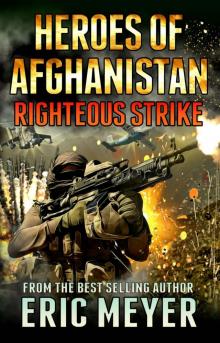 Righteous Strike
Righteous Strike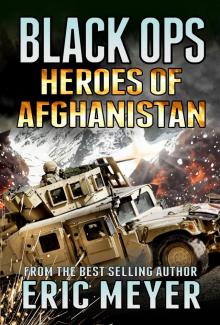 Black Ops Heroes of Afghanistan
Black Ops Heroes of Afghanistan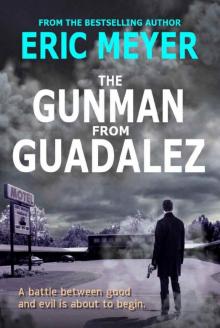 The Gunman from Guadalez
The Gunman from Guadalez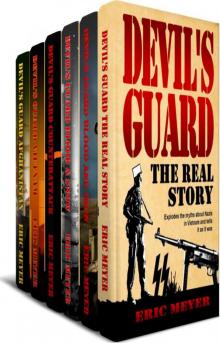 Devil's Guard- The Complete Series Box Set
Devil's Guard- The Complete Series Box Set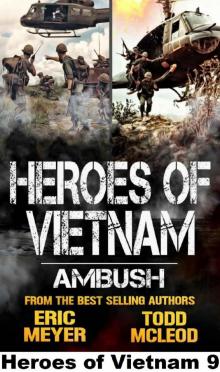 Ambush
Ambush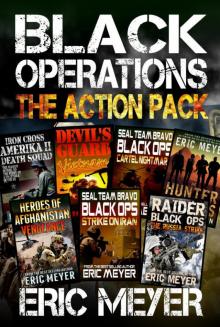 Black Operations- the Spec-Ops Action Pack
Black Operations- the Spec-Ops Action Pack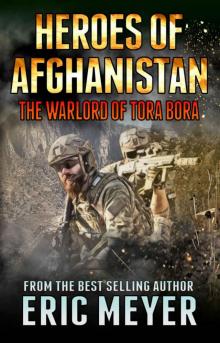 The Warlord of Tora Bora
The Warlord of Tora Bora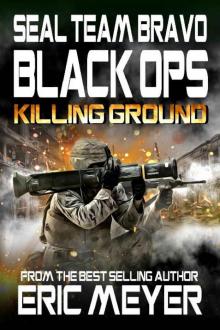 Killing Ground
Killing Ground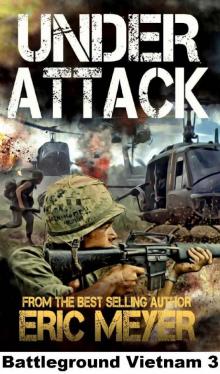 Under Attack
Under Attack